Essay On Realism – Structure/Outline
- Introduction
- History of Realism
- Theories Related to realism
- Different Assumptions of Realism
- Importance of Realism
- Criticism on Realism
- FAQs
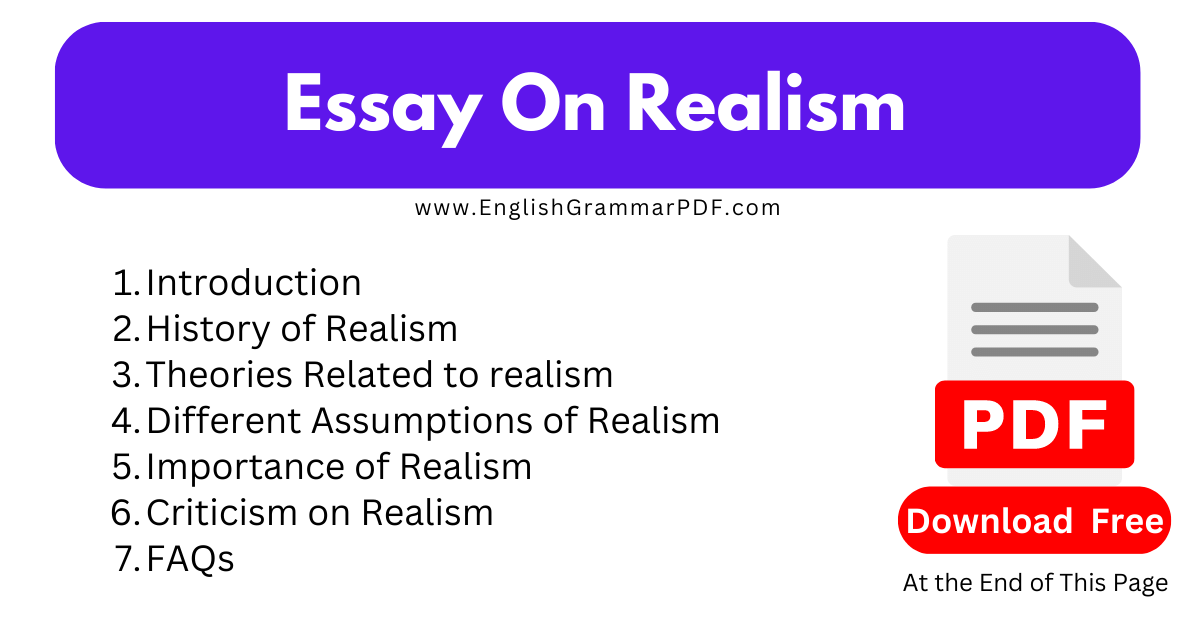
Introduction
Realism has become a beloved school of literature and art since its inception. Its definition is the focus on an everyday activity and existing situations from the perspective of representation of life as it is, in all its imperfections.
Core to the definition of realism is its’ use of the mundane and scientific approach to exploring human relationships, their emotions, and political movements in their contexts. With this style, authors can discuss uncomfortable truths about humanity’s condition in a more palatable manner for an audience that benefits from being exposed to new insights into what life can be like for real people living under complex conditions.
Its presentation of an accurate reflection of society has allowed realism to remain so popular throughout history, as audiences can relate to realistic characters sharing common experiences and flaws that make the story accessible no matter which parts of the world readers come from.
History of Realism
The term ‘realism’ was first used by the French philosopher Jean-Jacques Rousseau in 1750 when he wrote about realism as a form of art. However, it wasn’t until the 19th century that literary movements emerged using this style. In 1855, realist writers such as William Dean Howells and Mark Twain became popular in the United States. In France, realism was embraced by Gustave Flaubert and Honoré de Balzac while Charles Dickens used it to describe working-class life in England.
Theories Related to Realism
Realism is often thought of as being a reaction against romanticism, which focused on emotion and idealized characters. Realism explored a more scientific approach to literature and art, focusing on everyday life and portraying it as accurately as possible.
This led to the development of many theories surrounding realism such as those put forward by David Lodge in his book The Modes of Modern Writing (1977) and Alastair Fowler’s New Directions in Literary Theory (1984).
Classical Realism
It is the original form of realism and is based on the belief that art should be objective and accurate in its representation of life. This theory was put forward by Plato and Aristotle, who both argued for realism as an ideal form of literature.
Classical realism is a realistic interpretation of international politics, which emphasizes the competitive and conflictual nature of states. It holds that states are the most important actors in world politics and believes that people in power typically act rationally when pursuing their national interests.
As such, the theory assumes that war will be common among state rivals to ensure their security and promote their interests. Classical realism can be seen as an alternative to other forms of international relations theories such as liberalism, which instead focuses on cooperation. All in all, this theory offers an explicit definition of realpolitik or power politics.
Modern Realism
Modern Realism is a more recent theory that focuses on how reality can be represented in different ways according to individual perspectives. This theory was developed by the likes of Jean-Paul Sartre, Hans-Georg Gadamer, and Roland Barthes who all argued that realism is an individual experience that can only be fully understood through the context of each person’s worldview.
Modern realism represents an approach to writing, art, and philosophy that seeks to depict the world as it truly is. This definition differs from naturalism and encompasses both objective truths as well as subjective experience.
It allows the artist or author to create resilient and meaningful work by exploring characters, cultures, and circumstances in a gritty and candid way. By doing so, modern realism can suggest that truth exists beyond what is widely accepted and encourages thoughtful conversations about complex social issues.
Different Assumptions of Realism
Realism is based on the assumption that reality exists independently of an observer, meaning that there can be multiple interpretations of it at once. It also assumes that individuals have free will and can make choices and decisions, and this will affect the way they perceive reality.
Similarly, realism believes that the representation of reality should be as accurate and unaffected by any bias or personal opinion. This means that characters in realistic stories are often portrayed as flawed, with very few exceptions to this rule.
Importance of Realism
Realism has been one of the most influential and important philosophical movements in history. It is a theory that has shaped literature, art, and philosophy as well as international relations and politics. By encouraging people to think more deeply about their experiences and perceptions, realism encourages individuals to question what they know and consider different perspectives.
This can help us understand why certain events happen in the world and create meaningful discussions about them. Additionally, realism has also been used to challenge dominant social structures by showing how they are experienced differently by different people. Therefore, it is important to recognize and appreciate the power of realism in our daily lives.
Realism is an invaluable part of our culture and should be appreciated for its ability to provide us with a more accurate representation of the world.
It encourages creative ways of thinking and allows us to explore different perspectives to gain a better understanding of reality. Although it can be difficult to accept, realism can help us become better informed and ultimately take more meaningful actions when it comes to important issues.
By embracing realism, we can gain a better understanding of the complex world around us and make more informed decisions about our own lives. Ultimately, this is why realism remains an important part of our culture today.
Criticism on Realism
Realism has been criticized for its lack of emotion and idealistic views on life. Some people believe it does not capture the complexities of life, and that it can be too focused on mundane details. Others argue that realism is not always an accurate representation of reality as it often relies heavily on personal interpretation. Furthermore, many people have argued that realism fails to capture the beauty of life and overlooks the importance of imagination and creativity.
FAQs
What are the views of realism?
Realism views the world as it truly is and encompasses both objective truths as well as subjective experience. It allows the artist or author to create meaningful work by exploring characters, cultures, and circumstances in a gritty and candid way.
What are the characteristics of realism?
Realism is based on the assumption that reality exists independently of an observer and assumes that individuals have free will. Thus, characters in realistic stories are often portrayed as flawed, with very few exceptions. Additionally, realism also encourages thoughtful conversations about complex social issues.
Why is realism important?
Realism is important because it has been one of the most influential and important philosophical movements in history. It encourages individuals to think deeply about their experiences and perceptions and allows us to explore different perspectives to gain a better understanding of reality.
What are the three essentials of realism?
The three essentials of realism are 1) reality exists independently of an observer, 2) individuals have free will, and 3) characters in realistic stories are often portrayed as flawed. These three elements work together to create meaningful works that accurately capture the complexity of human life.
How does realism shape literature?
Realism shapes literature by encouraging authors and artists to explore characters, cultures, and circumstances in a gritty and candid way. This allows readers to gain a better understanding of the complexities of life by exposing them to different perspectives.
Essay On Realism (Pictures and PDF)
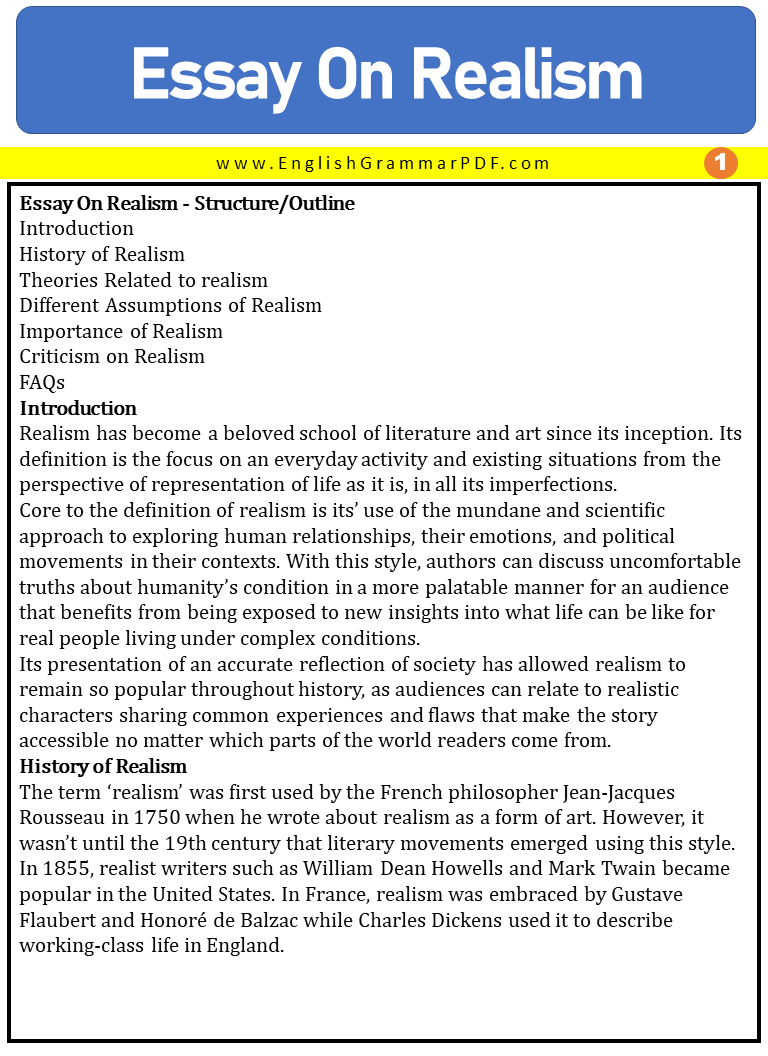
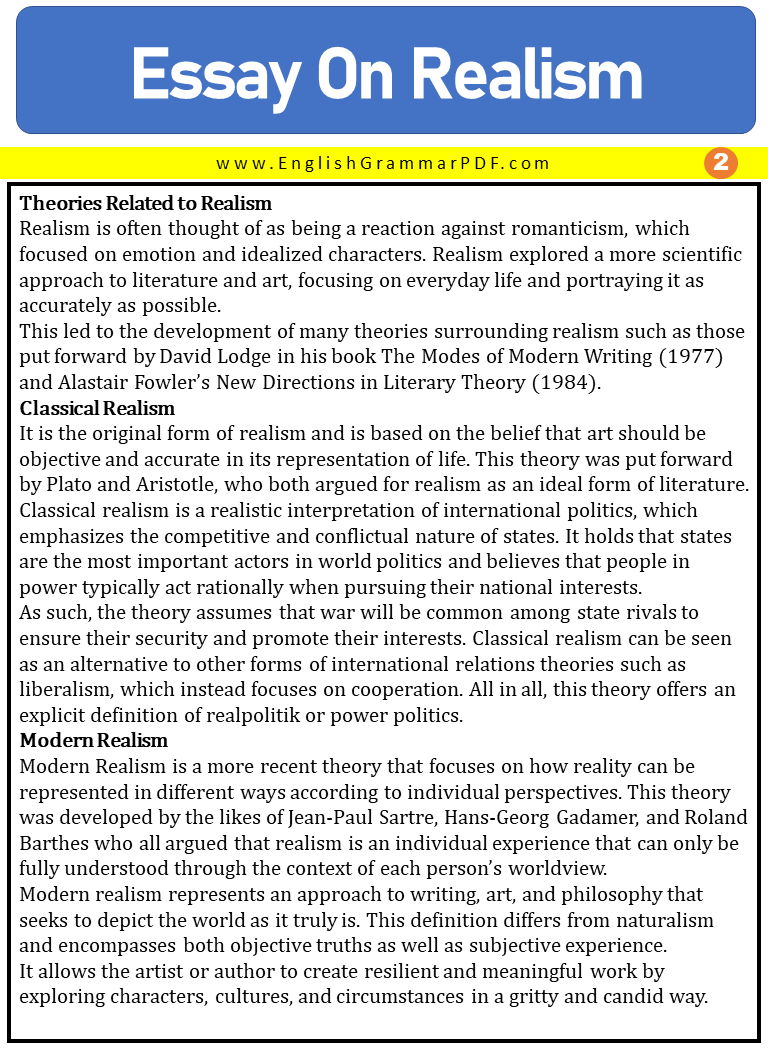
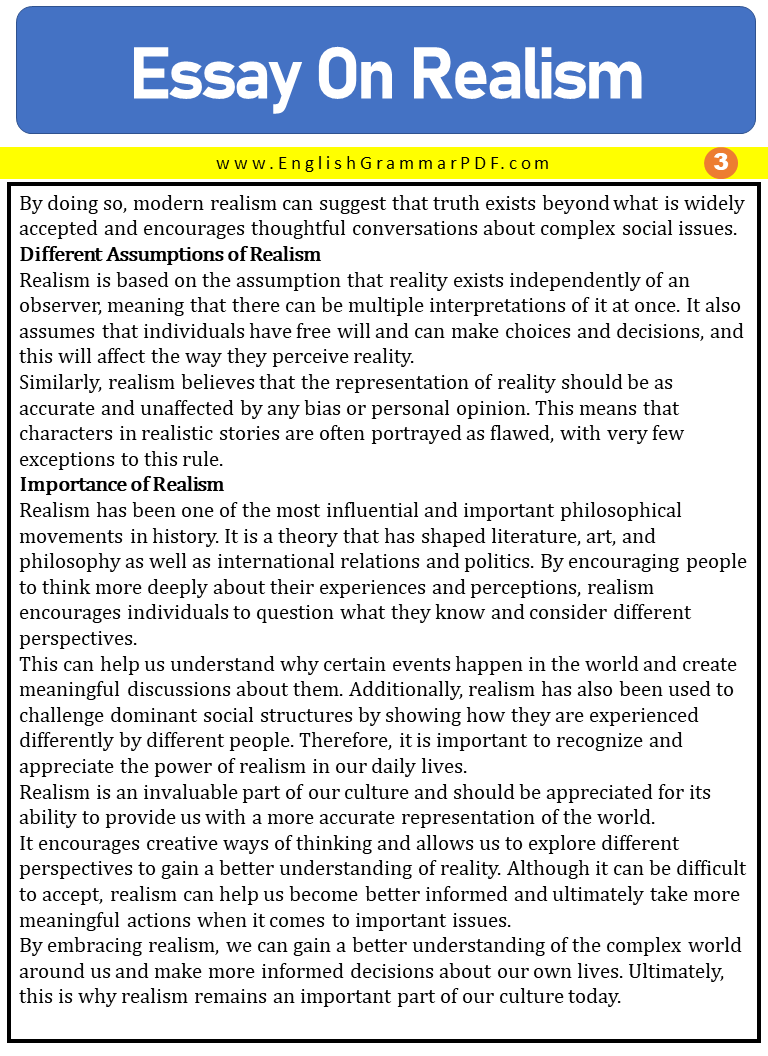
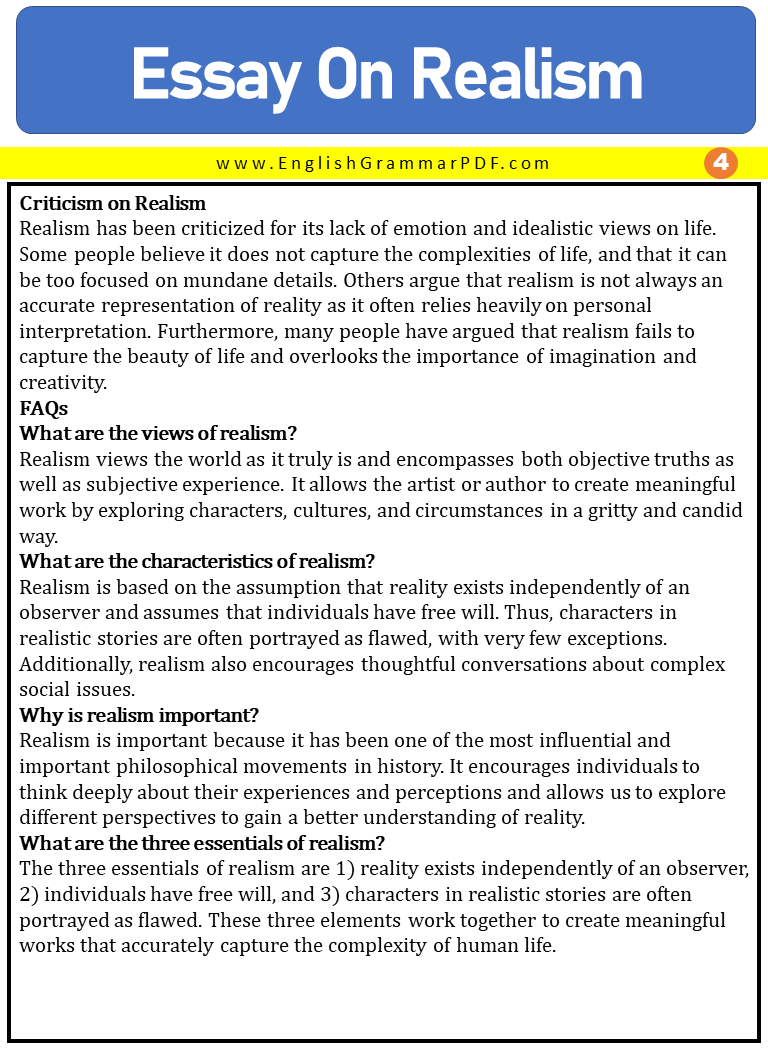
Related: 1000 Words Essay On China
Download this essay in PDF, below.


